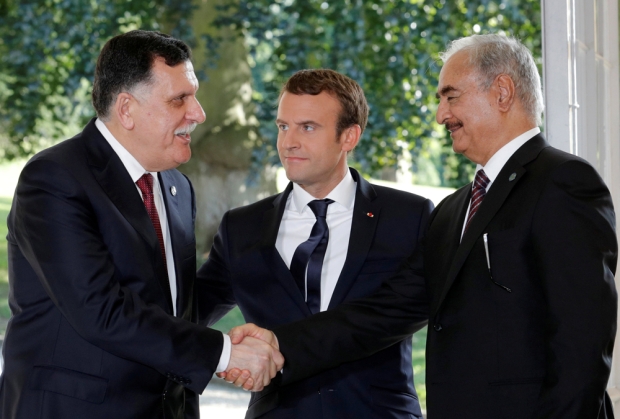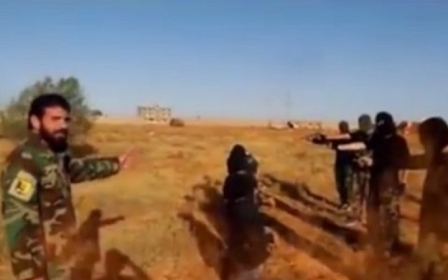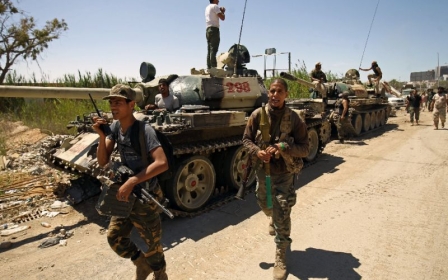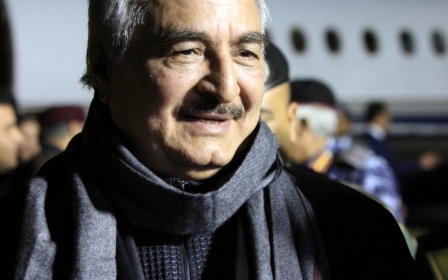Boris Johnson backs Khalifa Haftar's fight against 'terror' in Libya
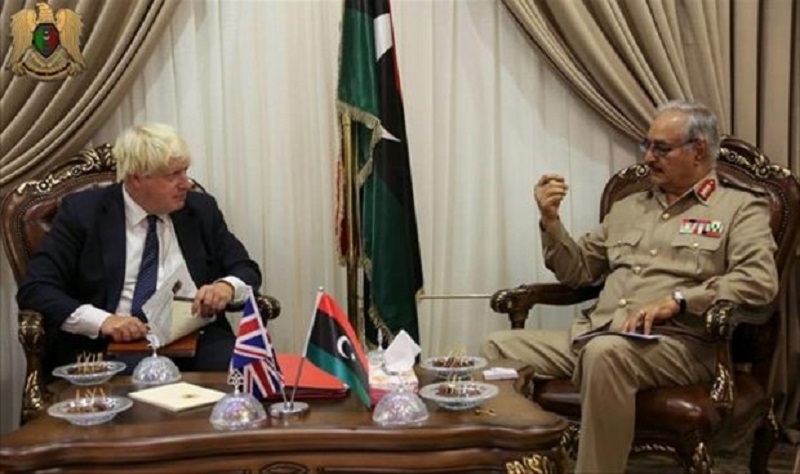
Britain's foreign secretary on Friday backed Khalifa Haftar's self-styled Libyan National Army's fight against "umpteen militias" in the country, a day after meeting the renegade general in his eastern power base of Benghazi.
Speaking after a two-day trip to Libya, Boris Johnson said the country's factions "need to come together behind the UN plan", but backed Haftar's forces fight against "terror".
"On terror there is no question... in the lawless areas of Libya you have umpteen militias vying for control with the Libyan National Army," he told the BBC's Today programme.
On terror there is no question... in the lawless areas of Libya you have umpteen militias vying for control with the Libyan National Army
- Boris Johnson, British foreign secretary
He did not mention by name forces aligned with the UN-backed Tripoli-based Government of National Accord (GNA).
His comments came after he met Haftar on Thursday, where he urged him to stick to a ceasefire announced in Paris last month, and to back UN-led efforts to end Libya's conflict.
But the visit and his remarks on Friday were the latest show of growing Western recognition for Haftar, who has long been supported by Egypt and the UAE and rejects the GNA's authority.
The GNA, hampered by infighting and its failure to win endorsement from eastern-based factions, has largely failed to extend its authority or end the turmoil that developed after a Nato-backed uprising toppled Libyan leader Muammar Gaddafi in 2011.
Since 2014 Libya has had rival governments in Tripoli and the east. It has become the main departure point for people crossing to Europe and it has seen Islamic State establish and then lose a regional stronghold in the coastal city of Sirte.
Johnson told the BBC on Friday that the tide was turning despite the ongoing schisms.
"Things did not go according to plan in 2011. We were way over-optimistic when Gaddafi was toppled," he said in reference to British support to eject the long-time Libyan leader. He added that elections since 2011 had made things "worse".
"Politicians need to suppress their own selfish interests and get behind the UN plan. If the Libyans and the world community can get behind the UN plan we have a chance."
Johnson said British support for Libya was crucial, particularly in stemming the numbers of people trying to cross the Mediterranean to get into Europe.
"This is a tragedy for those people," he said, and called people-smugglers "the most evil, nauseating travel agents in the world".
However, he rejected claims by NGOs and aid groups that the Libyan coastguard, which is being trained by the British government, had fired on boats off the coast.
"The Italians have been concerned that some of the NGOs have been inadvertently perhaps been acting as a pull factor.
"Where there is evidence of a breach of law of the sea that is to be deplored - but none of that has been seen."
International efforts to broker a political deal have resulted in two meetings between Haftar and the GNA's prime minister, Fayez Seraj, one in Abu Dhabi in May and the other in Paris in July.
At the Paris meeting the two men shook hands on a ceasefire and elections next year, though Haftar quickly played down the commitments.
Haftar, who fell out with Gaddafi in the 1980s and lived for two decades in the US, remains a divisive figure in Libya.
His forces have replaced civilian mayors in many eastern cities and talked of "liberating" Tripoli. Critics have said they fear a return to military rule.
Johnson met Seraj in Tripoli on Wednesday, and also travelled to Misrata, a port city and major military power that has led opposition to Haftar.
The British foreign secretary on Thursday said he had encouraged Haftar to back new UN envoy Ghassan Salame's efforts to find a political settlement for Libya by revising the 2015 deal that created the GNA.
"Field Marshal Haftar has a role to play in the political process," Johnson said.
"I urged him to adhere to the commitments he made during recent meetings in Paris, to respect a ceasefire, and to work with Mr Salame in order to amend the Libyan Political Agreement."
"I have encouraged all sides to resolve their differences by dialogue, not conflict, and to respect international human rights law," Johnson said.
Since the meeting in Paris, Haftar's Libyan National Army has threatened to advance into the eastern city of Derna, and tightened a blockade around the city.
The International Criminal Court has also issued an arrest warrant for a commander in a Libyan National Army unit accused of executing dozens of prisoners in the closing stages of the Benghazi campaign.
The Libyan National Army has said it is "investigating" the case.
Middle East Eye propose une couverture et une analyse indépendantes et incomparables du Moyen-Orient, de l’Afrique du Nord et d’autres régions du monde. Pour en savoir plus sur la reprise de ce contenu et les frais qui s’appliquent, veuillez remplir ce formulaire [en anglais]. Pour en savoir plus sur MEE, cliquez ici [en anglais].


